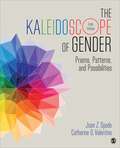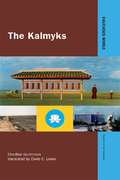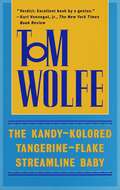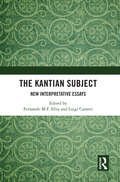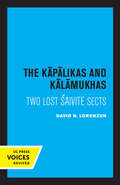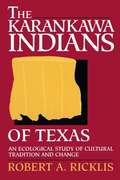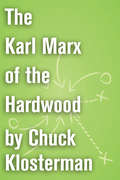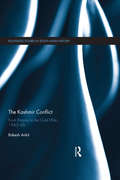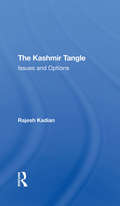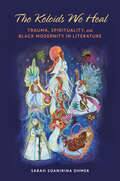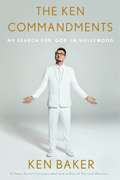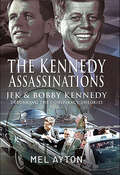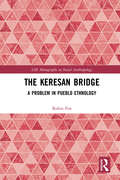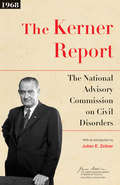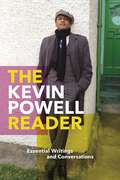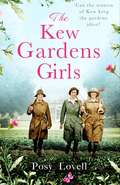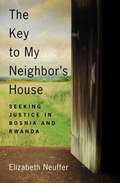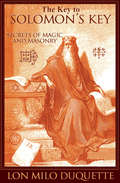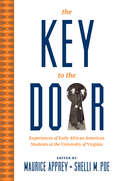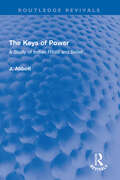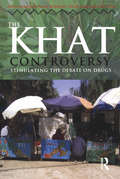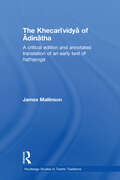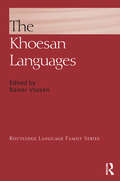- Table View
- List View
The Kaleidoscope of Gender: Prisms, Patterns, and Possibilities (Fifth Edition)
by Joan Z. Spade Catherine G. ValentineIn this anthology, scholars explain how the complex, evolving pattern of gender is constructed interpersonally, institutionally, and culturally, and challenges students to question how gender shapes their daily lives.
The Kalmyks (Caucasus World: Peoples of the Caucasus)
by Elza-Bair Mataskovna GouchinovaThe Kalmyks are in a unique position among the peoples of Europe in several respects, most conspicuously as being the only Buddhist people group in Europe. Until recently they had been a nomadic people, grazing their flocks and herds in the steppe lands north of the Caspian Sea, between the Volga river and the Caucasus mountains. Nowadays, with Russia’s transition to a post-Communist state, the relatively young President of Kalmykia stands out as being a self-made millionaire who has helped put his region 'on the map' not only by promoting economic ties with Japan and the West but also by hosting an international chess Olympiad. This practical guide written by a Kalmyk anthropologist, provides a comprehensive introduction to the Kalmyk people. The wide-ranging chapters give an overview of the Kalmyks, focusing on many facets of the Kalmyk culture, including language use, the traditional nomadic economy and dwellings, Kalmyk family and gender relationships, rites of passage, food and clothing, folk crafts, Kalmyk religion and the role of folklore and epic in Kalmyk culture. The Kalmyks provides an original and fascinating perspective on little-known Asiatic people whose history and culture have become intertwined with that of Europe.
The Kandy-Kolored Tangerine-Flake Streamline Baby
by Tom WolfeBestselling author Tom Wolfe introduces the 1960s through essays about extravagant new styles of life, the Beatles, bouffant hairdos, Kar Kustomizers, and much more.
The Kansas Journey
by Jennie ChinnThe Kansas Journey is a 7th grade Kansas history textbook. The outline for this book is based on the 7th grade Kansas Standards for Social Studies and teaches history and government, economics and geography. The book enables students to gain a working knowledge and understanding of Kansas's history in the context of American history.
The Kantian Subject: New Interpretative Essays
by Fernando M.F. Silva and Luigi CarantiThis book presents a critical reconsideration of the Kantian cognitive and practical subject. Special attention is devoted to highlight the complex relation between subjectivity as it is presented in the three critiques and the way in which it is construed in other writings, in particular the Anthropology. While for Kant our cognitive apparatus and the structure of our will are common to all humans, the anthropological subject reveals degrees of variation, depending on a myriad of external circumstances that pose a challenge to the unity of Kant’s account and await theoretical solutions. The essays collected in the volume delve into how the different shapes of human nature are not unrelated. They explore how and why different “Kantian subjects” are closely connected and at their core, if not entirely unified. The notions of personality, humanity, and citizenship will serve as leading threads for the reconstruction of this possible underlying unity. An engaging read that promises to deepen our understanding of human nature, the volume will be of great interest to scholars and researchers of philosophy, politics, psychology, social anthropology, ethics, and epistemology.
The Kapalikas and Kalamukhas: Two Lost Saivite Sects (Center for South and Southeast Asia Studies, UC Berkeley)
by David LorenzenThis title is part of UC Press's Voices Revived program, which commemorates University of California Press’s mission to seek out and cultivate the brightest minds and give them voice, reach, and impact. Drawing on a backlist dating to 1893, Voices Revived makes high-quality, peer-reviewed scholarship accessible once again using print-on-demand technology. This title was originally published in 1972.
The Karankawa Indians of Texas: An Ecological Study of Cultural Tradition and Change
by Robert A. RicklisPopular lore has long depicted the Karankawa Indians as primitive scavengers (perhaps even cannibals) who eked out a meager subsistence from fishing, hunting and gathering on the Texas coastal plains. That caricature, according to Robert Ricklis, hides the reality of a people who were well-adapted to their environment, skillful in using its resources, and successful in maintaining their culture until the arrival of Anglo-American settlers. The Karankawa Indians of Texas is the first modern, well-researched history of the Karankawa from prehistoric times until their extinction in the nineteenth century. Blending archaeological and ethnohistorical data into a lively narrative history, Ricklis reveals the basic lifeway of the Karankawa, a seasonal pattern that took them from large coastal fishing camps in winter to small, dispersed hunting and gathering parties in summer. In a most important finding, he shows how, after initial hostilities, the Karankawa incorporated the Spanish missions into their subsistence pattern during the colonial period and coexisted peacefully with Euroamericans until the arrival of Anglo settlers in the 1820s and 1830s. These findings will be of wide interest to everyone studying the interactions of Native American and European peoples.
The Karl Marx of the Hardwood
by Chuck KlostermanOriginally collected in Chuck Klosterman IV and now available both as a stand-alone essay and in the collection Chuck Klosterman on Sports, this essay is about Steve Nash.
The Kashmir Conflict: From Empire to the Cold War, 1945-66 (Routledge Studies in South Asian History)
by Rakesh AnkitThis book presents a study of the international dimensions of the Kashmir dispute between India and Pakistan from before its outbreak in October 1947 until the Tashkent Summit in January 1966. By focusing on Kashmir’s under-researched transnational dimensions, it represents a different approach to this intractable territorial conflict. Concentrating on the global context(s) in which the dispute unfolded, it argues that the dispute’s evolution was determined by international concerns that existed from before and went beyond the Indian subcontinent. Based on new and diverse official and personal papers across four countries, the book foregrounds the Kashmir dispute in a twin setting of Decolonisation and the Cold War, and investigates the international understanding around it within the imperatives of these two processes. In doing so, it traces Kashmir’s journey from being a residual irritant of the British Indian Empire, to becoming a Commonwealth embarrassment and its eventual metamorphosis into a security concern in the Cold War climate(s). A princely state of exceptional geo-strategic location, complex religious composition and unique significance in the context of Indian and Pakistani notions of nation and statehood, Kashmir also complicated their relations with Britain, the United States, Soviet Union, China, the Commonwealth countries and the Afro-Arab-Asian world. This book is of interest to scholars in the field of Asian History, Cold War History, Decolonisation and South Asian Studies.
The Kashmir Tangle: Issues And Options
by Rajesh KadianWith rare objectivity, Rajesh Kadian assesses past and present conflicts in Kashmir, one of the world’s most long-standing trouble spots. He traces the regions controversial history from the 1947 partition to the surging tide of militancy now building in the Kashmir Valley, which has further strained relations between India and Pakistan. Kadians si
The Keloids We Heal: Trauma, Spirituality, and Black Modernity in Literature (Transformations: Womanist studies)
by Sarah Soanirina OhmerWomen of colors and a literature written in corporeal and spiritual scars The corporeal and spiritual healing in literature by women of colors can be seen to redefine modern thought and printed text. Sarah Soanirina Ohmer traces the impact of colonization and enslavement on Black women and Black women’s contributions to colonial, nineteenth, and twentieth century literature in the US, Brazil, and the Caribbean. Drawing on intersectional analysis, Ohmer focuses on portrayals of trauma and spirituality in works by Toni Morrison, Conceição Evaristo, Maryse Condé, Gloria Anzaldúa, the Quilombhoje poets, and María de los Reyes Castillo. Ohmer compares literature from different countries along four thematic pathways: ghosts, mirrors, naming, and motherhood. Her analysis unlocks the literature’s power to heal through gut-wrenching descriptions of wounds and thrilling passages of hope and liberation. Throughout, Ohmer weaves in her life story as a Black woman as she reflects on how colonialism, racism, sexism, and capitalism have impacted her work, traumas, and faith journey.
The Ken Commandments: My Search for God in Hollywood
by Ken BakerDo the Kardashians really believe in God? An E! News star mixes memoir and investigative journalism in his own rollicking, poignant, and masterful version of A.J. Jacobs’ A Year of Living Biblically, chronicling his own spiritual journey as he investigates the religious lives of the rich and famous in Hollywood. Ken Baker, the popular L.A.-based senior correspondent for E! News and E! Online, has worked in Hollywood for over twenty years—hobnobbing with multimillionaires and interviewing movie, music and TV stars such as George Clooney, Britney Spears, Brad Pitt, Angelina Jolie and Kim Kardashian, day in and day out. In that time, and in the land of fairy tales and double-dealing, Baker had become one of the materialistic, carnal people he never wanted to be, abandoning his Christian heritage and losing his spiritual center in the process. Finding himself alone and confused one day in Vegas, he has an awakening that puts him on a journey to find God, not only in himself, but in the celebrities whose lives intersect with his both professionally and personally. In The Ken Commandments, Ken sets off on an experiment that will bring him closer to the spiritual lives of such diverse luminaries as Deepak Chopra, Tom Cruise, Selena Gomez, Justin Bieber, Joel Osteen and Gwen Stefani and in the process help to reveal the light and dark of Hollywood in new ways. From New Age spirituality, to Bible-based Christianity, to Scientology, to Buddhist retreats, to meditation classes, to Atheism studies, to the mega-church of the nation's top TV preacher, Baker immerses himself in a range of spiritual practices side by side with the celebrity set, revealing a world that is deeper, more questioning and more God-centered than you'd ever imagine.
The Kennedy Assassinations: JFK and Bobby Kennedy—Debunking The Conspiracy Theories
by Mel AytonFew events have been the subject of more conspiracy theories than the assassinations of the two Kennedy brothers. Indeed, a great many people consider that there were other individuals than Lee Harvey Oswald and Sirhan Sirhan involved in both murders. Was a shot fired from Dealey Plaza’s grassy knoll? Why did Jack Ruby shoot Oswald? Was it the CIA, the Soviets, Cuban nationalists or the Mafia that arranged John Kennedy’s assassination? Was Robert Kennedy shot from in front and behind, and who had the most to gain from his death? These are just a few of the questions that have been put forward by a myriad of conspiracy theorists and it is those people and their ideas that Mel Ayton has tackled head-on. Over many years, Mel Ayton has examined all the more substantial conspiracy theories and, through careful analysis of documents and eyewitness statements, he has demolished each one. In each case, Mel Ayton presented the results of his detailed investigations in periodicals as he worked through the various theories. These have now been brought together to provide a comprehensive analysis of all the main theories as to who, how and why the two Kennedy brothers met their deaths in such unusual circumstances. Though wild ideas will continue to be proposed and efforts will still be made to demonstrate that Oswald could not have fired off three shots with great accuracy in the few seconds available to him as the presidential cavalcade passed beneath the window where he crouched, or that there were sinister reasons why three CIA men were allegedly present on the night of Robert Kennedy’s assassination, the harsh reality is that the Kennedy brothers were each killed by lone gunmen. This is an absorbing read, brought up to date with the addition of new material as it has been uncovered. Maybe, just maybe, this book will persuade people that the official accounts of both murders, although flawed, are not cover-ups but simply statements of fact.
The Keresan Bridge: A Problem in Pueblo Ethnology (London School Of Economics Monographs On Social Anthropology Ser. #Vol. 35)
by Robin FoxThis is an unusual excursion into American Indian culture history by a British social anthropologist. It examines theories of the development of different Pueblo social structures, with particular attention to Eggan. From a detailed re-analysis of the evidence and a consideration of material from the Eastern Keresan Pueblo of Cochiti, based on his own fieldwork, Dr Fox concludes that the theory that all Pueblos were derived from a common base is no longer tenable, and that a diversity of origins is more probable. Apart from its contribution to Amerindian studies, the book is of particular interest as an approach to modern culture history by a social anthropologist.
The Kerner Report
by Julian E. Zelizer The National Advisory Commission on Civil DisordersThe Kerner Report is a powerful window into the roots of racism and inequality in the United States. Hailed by Martin Luther King Jr. as a "physician's warning of approaching death, with a prescription for life," this historic study was produced by a presidential commission established by Lyndon Johnson, chaired by former Illinois governor Otto Kerner, and provides a riveting account of the riots that shook 1960s America. The commission pointed to the polarization of American society, white racism, economic inopportunity, and other factors, arguing that only "a compassionate, massive, and sustained" effort could reverse the troubling reality of a racially divided, separate, and unequal society. Conservatives criticized the report as a justification of lawless violence while leftist radicals complained that Kerner didn't go far enough. But for most Americans, this report was an eye-opening account of what was wrong in race relations. Drawing together decades of scholarship showing the widespread and ingrained nature of racism, The Kerner Report provided an important set of arguments about what the nation needs to do to achieve racial justice, one that is familiar in today's climate. Presented here with an introduction by historian Julian Zelizer, The Kerner Report deserves renewed attention in America's continuing struggle to achieve true parity in race relations, income, employment, education, and other critical areas.
The Kevin Powell Reader: Essential Writings And Conversations
by Kevin PowellA hopeful and insightful collection by one of the great voices of our time KEVIN POWELL is one of the most prolific and acclaimed American writers, thinkers, activists, and public speakers of the past three decades. His writings are important contributions to our national conversations on race, gender, class, politics, pop culture, celebrity, hip-hop, and the past, present, and future of the United States. The Kevin Powell Reader is an electric and deeply inspiring selection from Powell’s lifework, spanning the Reagan-Bush years of AIDS and crack epidemics to our current era framed by the COVID-19 pandemic; the tragic killing of George Floyd; the #MeToo movement; and much more. In a journey that has produced fifteen books, countless cover stories, hundreds of published pieces, and definitive writings on iconic figures like Stacey Abrams, Dave Chappelle, Kerry Washington, Sidney Poitier, Cicely Tyson, Kobe Bryant, Tupac Shakur, Aretha Franklin, and Kendrick Lamar, Powell is a voice for our times, and a voice that is timeless. This collection also tracks Powell’s personal struggles and his unwavering honesty about himself and the world around him. The Kevin Powell Reader captures twenty-first-century America with hope, insight, and the urgent need to preserve freedom and justice for all people.
The Kew Gardens Girls: An emotional and sweeping historical novel perfect for fans of Kate Morton
by Posy LovellIt's 1916 and England is at war. Desperate to help in whatever way they can, Ivy and Louisa enlist as gardeners at Kew, taking on the jobs of the men who have gone to fight. Under their care, the Gardens begin to flourish - but Ivy and Louisa aren't being treated fairly, and not everyone wants them there. Without women's rights, the pair begin to struggle - but can the support of the Suffragettes help their cause? And when a tragedy overseas affects the people closest to them, can the women of Kew pull together to support themselves and their country through the darkest of times?A heartwarming historical novel about women in wartime, inspired by real life events. Readers love The Kew Gardens Girls:'This was a wonderful book to read, three girls from different backgrounds work at Kew gardens while the men are away at war.' 5 stars
The Key to My Neighbor's House
by Elizabeth NeufferInterviewing war criminals and their victims, Neuffer explains, through the voices of people she follows over the course of a decade, how genocide erodes a nation's social and political environment. Her characters' stories and their competing notions of justice-from searching for the bodies of loved ones, to demanding war crime trials, to seeking bloody revenge-convinces readers that crimes against humanity cannot be resolved by simple talk of forgiveness,or through the more common recourse to forgetfulness.
The Key to Solomon's Key: Is This the Lost Symbol of Masonry? (Second Edition)
by James Wasserman Lon Milo Duquette Mark StavishSketching out a fascinating network of historic figures, cults, and Christendom, this book by an occult-studies expert and respected authority on magic and sorcery takes Western spiritual traditions seriously--but examines them with common sense and self-effacing humor. Working backward from the Freemasons to one of their original orders, the 14th-century Knights Templar, the account considers sorcery, heresy, and intrigues; explores the legend that the Knights possessed a powerful secret dangerous to the Church of Rome; and finds an essential clue to the order's practices in their connection to the biblical Solomon, king of Israel in the 10th century BC. This updated edition features new images, chapters on important symbols, and a new preface.
The Key to the Door: Experiences of Early African American Students at the University of Virginia
by Maurice Apprey Shelli M. PoeThe Key to the Door frames and highlights the stories of some of the first black students at the University of Virginia. This inspiring account of resilience and transformation offers a diversity of experiences and perspectives through first-person narratives of black students during the University of Virginia’s era of incremental desegregation. The authors relate what life was like before enrolling, during their time at the University, and after graduation. In addition to these personal accounts, the volume includes a historical overview of African Americans at the University—from its earliest slaves and free black employees, through its first black applicant, student admission, graduate, and faculty appointments, on to its progress and challenges in the twenty-first century. Including essays from graduates of the schools of law, medicine, engineering, and education, The Key to the Door a candid and long-overdue account of African American experiences at the University’ of Virginia.
The Keys of Power: A Study of Indian Ritual and Belief (Routledge Revivals)
by J. AbbottThis book, first published in 1932, demonstrates how the control of certain ‘-isms’ has for long moulded the interpretation of Indian belief and ritual by Western writers particularly. In every chapter there is some new coordination, often iconoclastic of then-accepted theory, whilst the new wealth of customs carefully recorded is astonishing. Long disputed problems such as that of the Maratha ‘devak’, or that of the ceremonial sowing of seedlings known to Western scholars as the ‘gardens of Adonis’, have at last been settled through careful research.
The Khat Controversy: Stimulating the Debate on Drugs (Cultures of Consumption)
by David Anderson Axel Klein Susan Beckerleg Degol HailuKhat. A harmless natural stimulant or a lethal epidemic sweeping through the international drugs trade? Khat is a natural substance that, in the Middle East, is as ubiquitous as coffee is in the West. It is hugely popular in some African and Arab populations. But critics contend that it is a seriously addictive stimulant that damages the cardiovascular system. In a groundbreaking study, the authors go behind the veil of the drug, questioning its availability and its effect on its Red Sea producers. Interwoven with case studies from Djibouti to Rome, The Khat Controversy goes deeper to explore contemporary issues relating to globalization, ethnicity and culture. With its popularity escalating in London, Rome, Toronto and Copenhagen, khat is fast becoming a problem in the West. The first study of this contested drug, The Khat Controversy provides a concise introduction to the issues surrounding khat usage and suggests how policymakers should address them. The Khat Controversy: Stimulating the Debate on Drugs has received an honorable mention for the African Studies Association's 2008 Melville J. Herskovits Award.
The Khecarividya of Adinatha: A Critical Edition and Annotated Translation of an Early Text of Hathayoga (Routledge Studies in Tantric Traditions)
by James MallinsonDescribing one of the most important practices of hathayoga (khecarimudra), the Khecarividya of Adinatha is presented here to an English-speaking readership for the first time. The author, James Mallinson, draws on thirty Sanskrit works, as well as original fieldwork amongst yogins in India who use the practice, to demonstrate how earlier tantric yogic techniques developed and mutated into the practices of hathayoga. Accompanied by an introduction and an extensively annotated translation, the work sheds light on the development of hathayoga and its practices.
The Khoesan Languages (Routledge Language Family Series)
by Rainer VossenThe Routledge Language Family series is aimed at undergraduates and postgraduates of linguistics and language, and those with an interest in historical linguistics, linguistic anthropology and language development. According to a widely accepted hypothesis, the Khoesan languages represent the smallest of the four language phyla in Africa, geographically distributed mainly in Botswana and Namibia. Today, only 30 or so Khoesan languages may still exist, with about 300,000 native speakers. In other words, most Khoesan languages were already extinct before a sound scholarly interest in them could begin to develop. Drawing together a distinguished group of international experts, with much of the material taken from data collected by the authors’ own field work, this volume presents descriptive, typological, historical-comparative and sociolinguistic material on Khoesan. The Khoesan Languages contains eight sections: an introduction, an overview of genetic relationships, a typological survey and profile of Khoesan, four chapters covering core linguistic areas of Khoesan phonetics and phonology, tonology, morphology and syntax, and a final chapter tackling major issues in Khoesan sociolinguistics, as well as discussions of language contact. Comprehensive and scholarly, yet also lucid in its coverage of a broad range of languages, dialects and sub-groups, this unprecedented and original work represents the current state of Khoesan linguistics.
